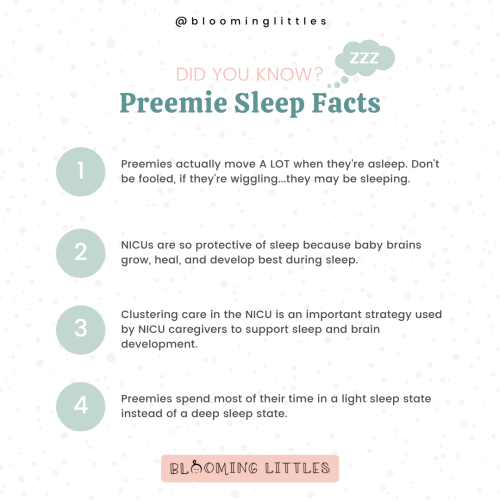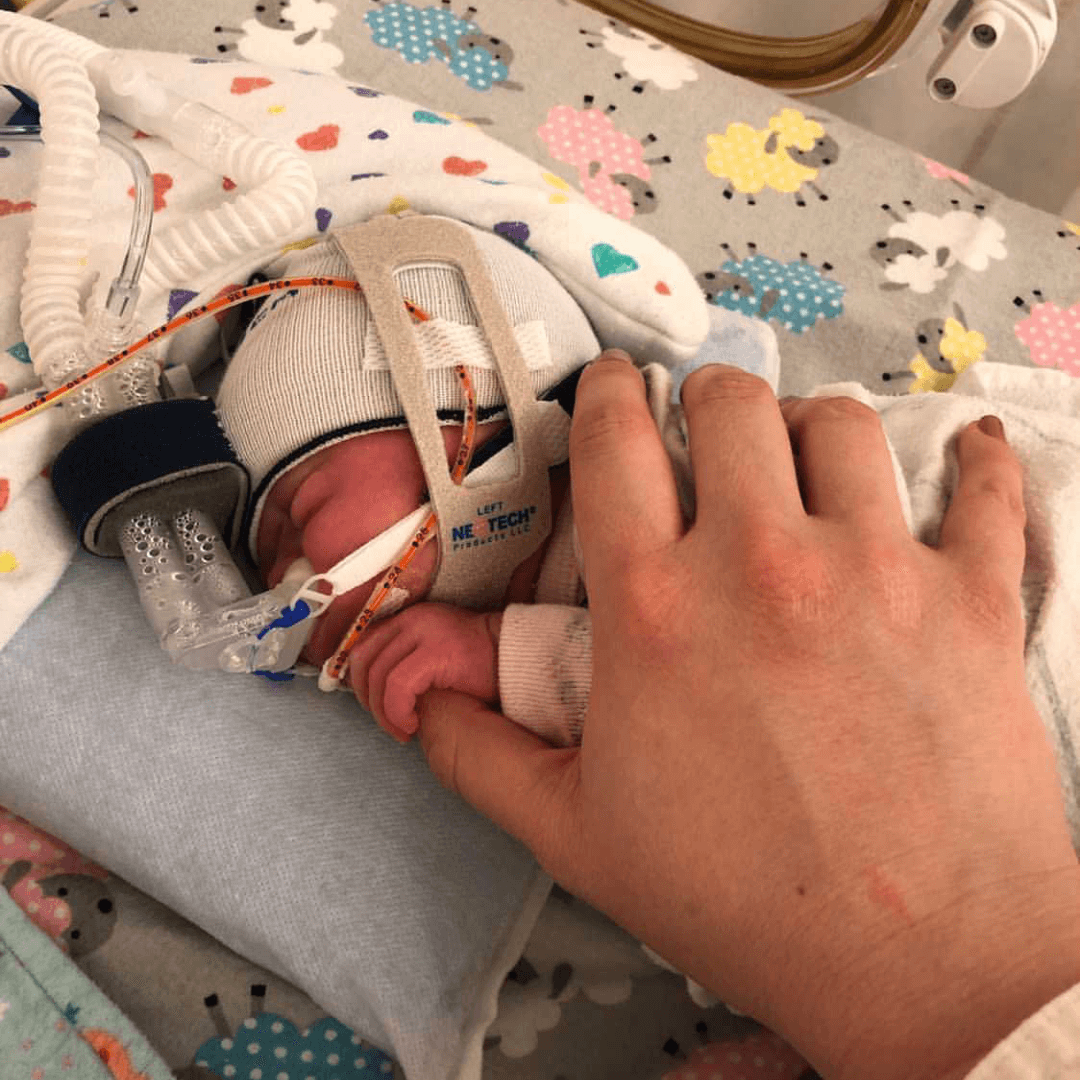
Have you ever spent the night in the hospital? I’m guessing if you’re here, you have delivered a baby, or know someone who has, and experienced the constant disruption of sleep, the uncomfortable beds, the unfamiliar food, and overall lack of privacy you get when you are trying to heal in a hospital setting.
It’s not comfortable.
Babies in the NICU are also growing, healing, learning to breathe, recovering from surgery, and attempting to develop under difficult circumstances.
Even though we can’t change everything about the NICU environment, and there are a lot of “rules” we have to follow based on your baby’s medical needs and unit guidelines…there are ways you can advocate for a more healing environment for your baby.
Let’s talk about some ways that we know support not only your baby’s overall development but also their medical goals, brain growth, and weight gain.

1. Try to keep sound levels low.
Depending on the type of unit your baby is spending time in, this may be easier in some settings than others. There are two main types of NICU environments. One is private rooms, where your baby has a room to themselves and is more adaptable to their individual needs…and the other is more of an open-bay style, where there are multiple babies in a single room.

Open-bay style NICUs are trickier to individualize and may make some of these recommendations more difficult, because you can’t adapt the lights and sounds to your baby’s individual needs.
But, this is definitely something you can be aware of and advocate for if you feel like your unit, bedside staff, spouse, or parent is making noise that is disruptive.
If you’re wondering how in the world you’re supposed to know whether your baby’s bed space is within the recommended sound levels, I’m going to give you a trick.
- Download a decimeter app to your cell phone. There are a lot of free options.
- When you open the app, the decimeter will pick up on how much sound is in your environment. Ideally, we want that number to be less than 55-65 dB.
That’s about the same as a whisper conversation.
Decibel X: dB Sound Level Meter is a free decimeter app you can download to your phone, for FREE!
2. If you’re in an open-bay style NICU, ask about putting up dividers for additional privacy.
The strategy for promoting a healing environment for your baby also applies to you. If you find yourself sitting in an open-bay style NICU where it’s noisy and there’s very little privacy…ask if your unit has access to privacy screens.
Some units have expandable screens that can be set up around your baby’s bed space to give you a little more privacy and help shut out some of the stimulation that comes from being in an open ward.
These can be especially helpful during those vulnerable bonding moments with your baby, like holding your baby skin-to-skin, pumping breast milk, or breastfeeding your baby.
3. Check that your baby’s eyes are shielded from direct light.
This next strategy can be tricky depending on the kind of bed space your baby is in. NICUs have different types of spaces all around the world!
If your baby is in a private room, you may have the ability to adjust the lighting specifically for your baby’s needs and age.
Some units even have some amazing dimmable light options, so it’s not all or nothing.
The majority of units don’t have customizable lighting options, so focus on making sure your baby’s eyes are shielded from direct light sources.
Here’s a tip! If your baby’s on their back and the light is on directly overhead…go ahead and turn the baby on their side OR provide a tented washcloth to protect their eyes from that light.
4. Protect your baby’s sleep.
Oh, this is a tough one, but super important because sleep is vital for your baby’s development and brain growth. If you’ve been in the hospital and tried to sleep, you know someone’s coming into your room every couple of hours to check on you and wake you up to check your vitals, or ask if you need anything, or take your blood pressure.
Ahhh! It’s infuriating as a patient.
Yet, our babies experience a similar environment.
They’re constantly being disrupted for procedures, tests, alarms, and assessments, etc.
You can protect your baby.
If you’re comfortable, talk with your baby’s nurse about making sure your baby’s care is occurring around their sleep cycles (if your baby wakes up, do their care; if they’re asleep, wait). This isn’t always possible (or safe!) in the busy NICU environment, but if you don’t need to wake your baby up for something, let them rest and finish a sleep cycle before you start with the next interaction.

5. Keep a scent cloth in your baby’s bed.
Scent cloths are one of the most comforting things you can provide for your baby when you have to spend time away from them. Your scent as mom and dad is really comforting, and believe it or not, even helps regulate your baby’s breathing rates and heart rates.
Soo, what is a scent cloth?
A scent cloth is a piece of fabric you wear in your shirt or under your bra for 24 hours, so your scent transfers to the fabric.
Then, you bring it with you when you visit your baby and place it near their head so they can smell your familiar scent. You can switch it out every 24 to 48 hours, so the scent stays fresh.
But, Katie, my baby is only 25 weeks old, can they even smell?
It’s crazy to think about, but YES!
Your baby’s sense of smell actually starts developing while they’re in the womb. They actually practice smelling and swallowing your amniotic fluid early on in gestation.
By the time of birth (even premature birth!), you are familiar to them!
Some NICUs have special names for scent cloths, like lovey‘s, and may provide them to you when your baby is admitted. BUT, if they don’t, you can create and provide them yourself.
Here is a cool link to how you can make your own no-sew scent cloth for your baby!
6. Hold your baby as much as possible.
Yes! I am giving you permission to hold your baby as much as you are medically allowed to. I’ve heard lots of parents talk about how difficult it is to ask permission to hold their own baby.
Depending on your baby’s age, medical stability, temperature stability, and overall day…it may influence how long and when you’re able to hold them.
I want to encourage you to, at the very least…ask your baby’s bedside nurse if (and when!) you can hold your little one. Sometimes, you may assume you can’t or aren’t allowed, when in reality it’s possible.
When you do get to hold your baby, try and hold them for at least 60 minutes, so they can get in a full sleep cycle before they’re transitioned back to bed.
If you’re not able to hold your baby for medical reasons, there are still ways you can support development and bond with your baby. Check out a couple of ideas here.
Part of what I get to do as a neonatal occupational therapist is help parents get comfortable getting their baby out of bed on their own with all the medical lines, (when it’s appropriate).
If you want to feel more confident while getting your baby out of bed, check out some of my must-have tips here.

7. Put up some personal photos or signs.
Now I think this last one is a great way to provide a healing environment for ALL of you…for every caregiver involved in your baby’s care, but especially for you as a family.
Your baby may be on an intense medical journey, but you and your family are also on a journey. You’re healing from pregnancy, birth, trauma, and learning to navigate this phase of life.
Make your baby’s space more personal.
- Bring family photos to tape up
- Share artwork created by older siblings
- Put up holiday-specific signage
- Add inspirational quotes or bible verses
- Make a cute name sign for the door
These personal touches even help us as providers connect with who you are as a family.
Get creative and enjoy personalizing your baby’s hospital space.
There are a lot of factors that can influence your baby’s overall gross motor, sensory, social, emotional, and cognitive development, as well as their ability to progress and meet their medical goals.
There has been a ton of research about the NICU space and the importance of creating a healing environment for your baby by prioritizing some of these strategies.
Some of these things like protecting your baby’s eyes from direct light may seem small in the grand scheme of their medical journey, but it’s something you can be in charge of that influences sleep, visual development, auditory development, pain, and stress.
Don’t minimize your role…you are amazing and capable of so much!

